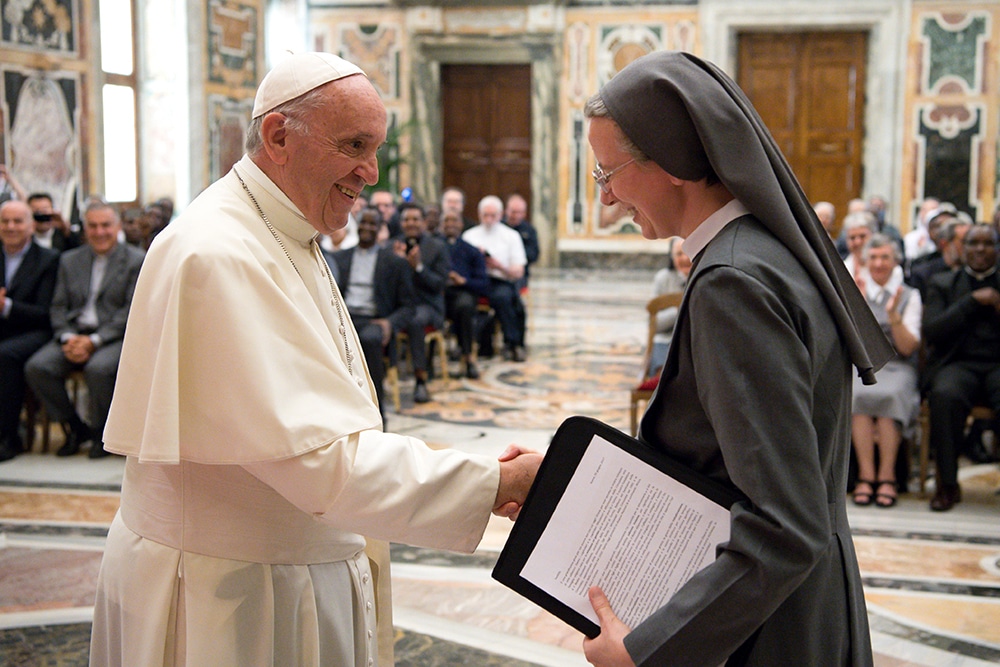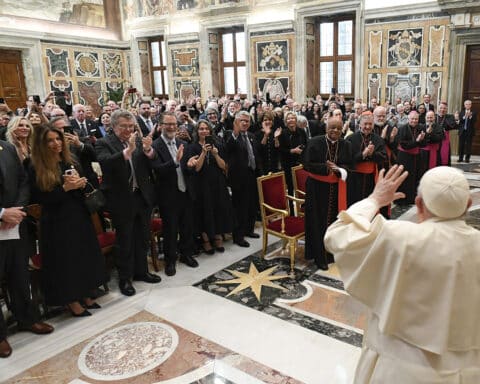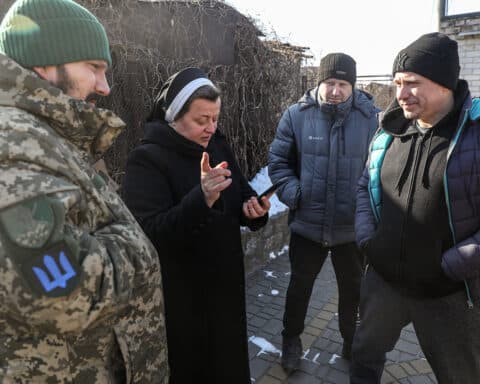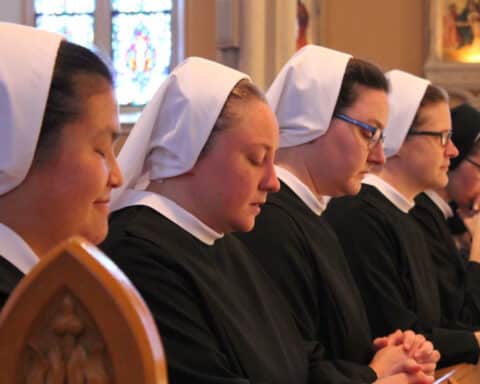“One of the characteristics of the feminine genius is precisely being capable of waiting,” Olga Krizova says. She is the general president of the Secular Institute of Volunteers of Don Bosco.
Her name suddenly became known on July 8, together with six superioress generals: Sisters Kathleen Appler, Daughters of Charity; Yvonne Reungoat, Daughters of Mary Help of Christians; Françoise Massy, Franciscan Missionaries of Mary; Luigia Coccia, Comboni Missionary Sisters; Simona Brambilla, Consolata Missionary Sisters; and Rita Calvo Sanz, Order of the Company of Mary Our Lady. Pope Francis chose them as new members of the Congregation for the Institutes of Consecrated Life and the Societies of Apostolic Life, the first women members since the founding of this congregation in 1586, when it was established by Pope Sixtus V.
Today it is responsible for everything concerning institutes of consecrated life: orders and religious congregations, both of men and of women; secular institutes; and societies of apostolic life, including their governance, discipline, studies, goods, rights and privileges, as stated on the congregation’s Vatican website.
The vast majority of consecrated people in the Church are women. Today, even if through a small group, for the first time women will have a voice in this Vatican department, which is led by the Brazilian Cardinal Joao Braz de Aviz. Its undersecretary is currently a woman, Sister Carmen Ros Nortes, who replaced Sister Nicla Spezzati.
Noteworthy point
But truly noteworthy is that the latest appointments give women executive positions, rather than simply consultative roles. “The appointment came to me as a total surprise. I’m humbly and deeply honored by Pope Francis’ confidence in me,” Sister Kathleen Appler said. Out of the seven women appointed, she is the only one from the United States. She leads 14,500 Daughters of Charity, serving in 94 countries.
“I believe that this is a unique moment in our Church’s history, offering a concrete expression of the sacred trust and confidence that Pope Francis has in women religious,” she said. “I look forward to the richness that men and women representing different cultures, nationalities and charisms will bring to those matters being discerned by this group. I trust that the Holy Spirit will aid us in blending the wisdom, values and experience of those who are continuing this service with the ideals and inspirations of the newly named members thus enhancing all.”
| Congregation for Institutes of Consecrated Life and Societies of Apostolic Life |
|---|
|
The Congregation for Institutes of Consecrated Life and Societies of Apostolic Life “is competent for matters regarding the eremitical life, consecrated virgins and their related associations, and new forms of consecrated life. Its competence extends to all aspects of consecrated life: Christian life, religious life, clerical life; the relationship is of a personal character and has no territorial limits; certain determined questions of their members, however, are remanded to the competence of other Congregations. This Congregation also can dispense those who are subject to it from the common law. Further, it is competent for associations of the faithful erected with the intention of becoming institutes of consecrated life or societies of apostolic life, and for Third Orders Secular.” Source: www.vatican.va |
A female gaze
But why only now have some consecrated women been chosen as members of this congregation?
Olga Krizova simply said: “I don’t know. But I believe that everything happens at its time. Perhaps the congregation has discovered that it also needs a female gaze on some problems. Perhaps until now the Church had to face more urgent problems. … Time has come, anyway! We can start working with enthusiasm and sensitivity.”
This Slovakian woman is the only lay consecrated appointed. She welcomed the nomination “on a personal level with great humility and trust in the Holy Spirit, on an institutional level with joy and gratitude, because the Church chose a woman of a secular institute in particular.”
With the contribution of the seven women members, Krizova said: “I hope that the work of the congregation will receive a particular color. We consecrated women have a great wealth we can give and make available to everyone for a greater vitality of the Church. As women we are very sensitive to the suburbs, and often we are mothers for so many outcasts. … We have experience that Christ suffers and waits in the poor. Perhaps also through the instrument of the congregation, we can witness these values and make the Church and the world aware of living them with courage and boldness.”
Historical event
Some have spoken about these appointments as an historical event. Sister Luigia Coccia said, “Yes and no.” She is Italian, 50 years old, one of about 1,200 Comboni missionaries serving in 35 countries and devoted to the missio ad gentes, in Africa especially.
“It is not a start from nothing,” Sister Luigia said. “I am thinking of the meetings held regularly by the congregation with the UISG [International Union Superiors General] committee, the events where the congregation requires the presence of religious. In this sense I see the evolution of a process started a few years ago.”
But reflecting a little more, she said, “This is undoubtedly a historical event, since it means to recognize the irreplaceable role we have as religious sisters in this dicastery.”
How has the Church arrived at this point?
“Surely there has been the work of the Holy Spirit, but we don’t know times and places of his work. Beyond this, there are other elements that contributed to making this step possible,” Sister Luigia said.
“According to the vision of Pope Francis, the Church has its doors open to everyone, men and women, since in the Church there is a place for everybody,” Sister Luigia said, addressing the first factor. “Synodality is contagious, it becomes a way of proceeding. With such an approach, it is incomprehensible that in a congregation that deals with religious life, the voice of one of the parts that constitute this body is missing.”
The second element is “the historical moment the Church is going through,” she said. “The Church is courageously taking in its hands the sad reality of abuse, as very few other recognized institutions are doing. Therefore, today the Church is more ready to recognize the need we have of each other, the need to listen to the different parts, to develop new sensibilities, new understandings of the service we are called to give in the name of the Gospel. These appointments undoubtedly contribute to create the necessary conditions to avoid possible forms of abuse of power; widening the decision-making process there are more possibilities of respect for diversity.”
The third point is that “the female consecrated life is a majority, compared to the male one; it is a constitutive part of this dicastery,” she said. “Then we have the right and the duty to bring our reality, our reflections and proposals for this congregation to be at the service of consecrated life in the world. Not to be there would mean thinking about religious life in half, or less than half.”
Finally, “sitting around a table, men and women, listening to each other, is already a splendid announcement of communion, of courage to seek more reciprocity, more complementarity, and this is a prophetic witness to our world today where the relationship man-woman still suffers many forms of violence,” she said.
Consulters
Before July 8, Pope Francis also had chosen the first women consulters of the Synod of the Bishops. He previously named the first-ever woman consulters to the Congregation for the Doctrine of the Faith, along with two female undersecretaries at the Dicastery for Laity, Family and Life.
Even the Council of Cardinals discussed a greater role for women in the Roman Curia that will arise from the next reform. But although seven women are certainly not enough to reverse a trend that spans centuries, “it is the rupture of a practice,” Rita Pinci said. She is an Italian journalist and feminist, recently chosen by the Vatican to coordinate the editorial committee of “Women Church World,” the monthly insert of the official Vatican newspaper L’Osservatore Romano. “A co-presence of men and women in the life of the Church is necessary. The Church can be significantly enriched by feminine originality. Women, for me, have two extraordinary gifts: courage and taking responsibility.”
Deborah Castellano Lubov writes from Rome.
| Named to the Congregation |
|---|
|
Others named to the Congregation for Institutes of Consecrated Life and Societies of Apostolic include:
|





